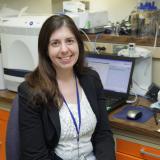Dr. Rebecca Weingarten

Staff Scientist @ National Institutes of Health (NIH)
I am a microbiologist at the Clinical Center at NIH. I spend most of my day at the lab bench performing experiments to better understand how antibiotic resistance is spread among pathogenic bacteria. I also get to attend seminars given by world renowned scientists to learn about other research topics (like Ebola!). I do spend some time at my desk reading journal articles, writing papers and protocols, and analyzing data.
How I Got Here
ShowI went directly from my undergraduate studies at the University of Wisconsin-Madison to a PhD program at North Carolina State University. I spent 5 years as a postdoctoral fellow before my recent transition to a permanent position at the NIH.
While you need to earn an undergraduate degree in science (of your choosing), it is more important to get experience in a research lab. I was hired as a dishwasher in a plant pathology lab my sophomore year. By my senior year, I had earned a summer fellowship, completed a research project and became a published author. That was what got me started on my career path.
During my undergraduate research job, a postdoctoral fellow told me I had a knack for science and that I should get my PhD. Apparently, it didn't take much to influence my career path!
The Ups and Downs
ShowPros: A career in research is often times exciting and always changing. As a researcher, you get to plan your day and your schedule can be flexible. Microbiology, in particular, is an expansive field. You can focus on infectious diseases, agricultural, environmental, industrial, health promotion like probiotics and vaccines, and many more.
Cons: Experimental failures are the norm not the exception. Depending on the experiment, hours can be long and some weekend work is common, particularly early in your career. There are too many PhDs in the life sciences. Finding a job after your postdoctoral training is challenging. Only get your PhD if you are sure it is required for your career goals.
Recommendations
ShowInterested in a career in science? Apply for a lab tech job and see if you like it. Explore your options first - don't just jump into a post-graduate degree program like I did.